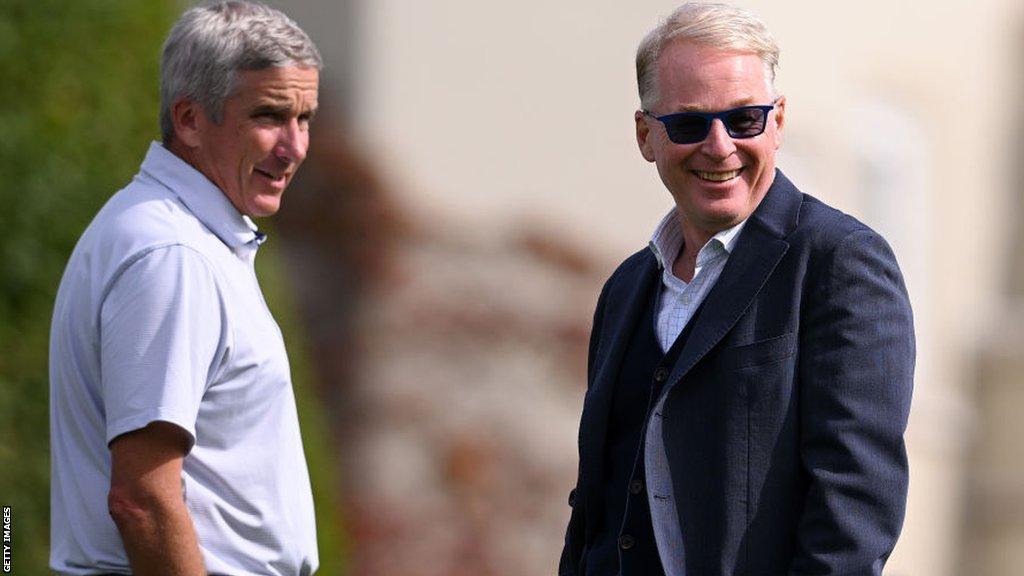'Keith Pelley: Departing DP World Tour chief executive leaving mixed legacy'
- Published
- comments

The 'strategic alliance' that DP World Tour boss Keith Pelley (right) struck with his PGA Tour counterpart Jay Monahan (left) helped bolster the European circuit's finances
Bob MacIntyre perhaps painted the most fitting picture of Keith Pelley's tenure as DP World Tour boss when he played at last week's Valspar Championship in Tampa.
The fact that the Scot was competing on those Floridian fairways was down to Pelley's most controversial contribution in his nine years in charge of the Wentworth-based organisation.
And MacIntryre's decision to use caddie Mike Burrows' bib to taunt US fans with the Ryder Cup result from last year's match was also telling. It reminded us of arguably Pelley's biggest triumph, the staging of that epic event in Rome last September.
This is the 60-year-old's final week in charge of the European tour before he heads back to his native Canada where he becomes boss of the four leading sports franchises in his home city of Toronto.
When he arrived in 2015 he was already aware of upstart plans for a golf super league. Pelley also knew that his new employers were struggling to rival the behemoth of the US-based PGA Tour.
His initial ambition was to make the European Tour a viable alternative for the continent's leading stars - to stem what had long since become an inevitable migration across the pond.
He was brash and combative. A diminutive figure, who wore flashy, colourful glasses with a vision to elevate the little guys from Europe into an outfit to rival the big boys Stateside.
It was a laudable ambition and a Rolex Series of elevated tournaments with inflated prize funds and enhanced television coverage soon followed. But these tournaments did nothing to stem the flow of talent crossing the Atlantic.
Pelley wanted to modernise golf but was hamstrung because his ultimate responsibility was to the tour's membership.
This meant a diverse list of priorities and inbuilt antipathy towards change unless there were guaranteed benefits to the individual members he needed to convince.
It was a tough environment because there were a lot of egos to satisfy among a wide range of members at differing stages of careers. Keeping everyone happy was nigh on impossible.
But Pelley did score success in improving the pace of play on his tour. There was music on certain ranges and a more modern feel at tournaments recognising the business opportunities of enhancing fan experiences.
Pelley knew the PGA Tour could not be beaten and his ultimate vision was for a world tour and collaboration with the United States. But there were also offers to consider from the upstart breakaway Premier Golf League.
The PGL claimed massive financial backing and a new and extraordinarily lucrative vision for the game. Combining with them could have been the pathway towards an organisation that could have genuinely rivalled Jay Monahan's US tour.
But Monahan was also keen to foster a closer relationship with Europe. Pelley instructed two senior executives to provide detailed analysis on both camps before eventually opting to go with the US Tour.
The 2020 strategic alliance with the PGA Tour was the safer option because, for all their talk PGL had no players signed up. And Monahan already had control of Europe's biggest stars such as Rory McIlroy and Jon Rahm.
The deal was also necessary to bolster the DP World Tour's finances which were dramatically and damagingly drained by the impact of covid.
This decision was also a savage blow to the PGL because Monahan stubbornly had no interest in dealing with any newcomers to the pro golf market. And the arrangement with the PGA Tour meant Pelley's hands were also tied in terms of joining forces with other organisations.
Then Saudi Arabia entered the market with a vengeance. The Kingdom's sportwashing tactics meant it took PGL's model, rocking the men's game like never before with the arrival in 2022 of the LIV tour.
Pelley was obliged to act in lockstep with Monahan. Many say the Canadian should have "done the deal" with Saudi Arabia and that was certainly the view of several enduring and celebrated European names who immediately jumped ship to LIV.
But, having also signed a massive contract to rebrand his circuit as the DP World Tour, Pelley could point to having secured the future for all of his remaining members and that, after all, was his number one priority.
He further strengthened the relationship with the PGA Tour in June 2022, negotiating hard to provide a formalised pathway for his 10 most successful players, not already exempt, to gain prized tour cards in the United States.
This highly contentious policy became reality at the start of this year and is why MacIntyre was in Florida last week.
The 27-year-old from Oban was also a member of the victorious Ryder Cup team and so took part in arguably the greatest edition of this famous match which remains the biggest event in golf.
Pelley staged the match in Italy and there was initially plenty of scepticism about that bold move. But a glorious week at Marco Simone was a resounding success - golf never felt more big time.
And that was always his vision for developing the game.
He had also piloted the tour through the unique challenges of covid, secured prize funds for the medium term and departs insisting its finances are secure.
As a player who served on the tour's tournament committee remarked: "How thankful I am to Keith for his work ethic and enthusiasm.
"Challenges largely beyond his control throughout his tenure inhibited his desire to grow the tour and instead he had to act in ways that would have been unforeseen when taking up the job."
Critics point to the fact that the best talent is now being given away on a yearly basis and that the European Tour is now intrinsically linked with the fortunes of a PGA Tour that is under massive pressure from the Saudi Arabia-funded LIV league.
So assessments on Pelley's legacy are mixed. The DP World Tour player added: "I accept his time as chief executive will be seen differently by some, but for me he was a good leader."
Having watched his tenure closely, I believe him to also be a warm, genuine, and thoughtful man. He possesses an astute business brain and did the best with the cards he was dealt.
But he departs with issues aplenty still to be resolved. The men's professional game is in turmoil and his successor - Ryder Cup director Guy Kinnings - faces a formidable in-tray.
